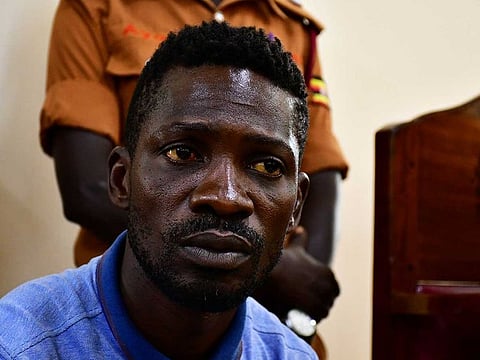Uganda opposition leader Bobi Wine charged, freed on bail
Detention ahead of January election sparked violence that left 37 dead

Kampala: A Ugandan court on Friday charged opposition leader Bobi Wine over an election rally which allegedly flouted COVID-19 rules, then freed him on bail, after his detention sparked violence that left 37 dead.
Wine was charged with “doing an act likely to spread infectious diseases contrary to the penal code and rules of the public health on COVID-19,” said judiciary spokesman Solomon Muyita.
Two days of protests were sparked by the arrest of Bobi Wine ahead of a political rally in support of his bid for the presidency in January 14 election.
Dozens died and hundreds were arrested as tyres were burned and police responded to hurled rocks with teargas, rubber bullets and live rounds in the capital Kampala and other towns.
On Friday, there was a heavy police and army presence in Kampala with roadblocks and security checks, after protests turned to looting and robberies the evening before.
Police spokesman Fred Enanga claimed the protests were “part of a loosely coordinated campaign” and not spontaneous, adding that bows and arrows, as well as bottles, tyres and fuel for incendiary devices had been found.
“All indicators reveal these were not just impromptu actions,” he said.
Enanga added that 375 people had been arrested with some suspects due to appear in court Friday, Wine among them.
Calls for release
The violence has raised fears and attracted condemnation.
“The increasing spate of violence so early in the campaign season does not bode well for the weeks to come before the elections,” said Oryem Nyeko, Africa researcher at Human Rights Watch.
The rights group called for Wine’s release and for security forces to “respect the rights of people to peacefully protest his detention”.
In New York, UN spokesman Stephane Dujarric on Thursday also called for Wine’s release.
“We call for the immediate release of the detained opposition leaders, including Bobi Wine, and it’s important that security forces act in a way that respects human rights principles and the rule of law in dealing with protesters.”
The US embassy said it deplored the violence and extended its sympathy to the victims and their families.
“We urge all parties to renounce violence, undertake good-faith measures to reduce tensions, and respect fundamental freedoms,” it tweeted.
‘Weaponising’ the pandemic
Wine, a 38-year-old popstar-turned-politician, has become a lightning rod for opposition to President Yoweri Museveni who is seeking a sixth term in power, extending his 36-year rule.
Many young Ugandans see Wine as their champion in a country mired in poverty and youth unemployment.
Museveni, a 76-year-old former rebel who seized power in 1986, is one of Africa’s longest-serving leaders.
Wine has been repeatedly arrested, most recently on November 3 after he filed his candidacy for the elections, his concerts are routinely banned and his public rallies broken up with teargas.
Other opposition candidates have also been detained and had their rallies broken up by security forces who claim the gatherings contravene COVID-19 restrictions.
However, Museveni’s own rallies have gone ahead unimpeded.
Human Rights Watch accused Uganda of seeking to “weaponise” pandemic restrictions.
“The authorities have consistently used COVID-19 guidelines as an excuse for violent repression of the opposition rather than to safeguard the democratic playing field for free and fair elections,” said Nyeko.
Sign up for the Daily Briefing
Get the latest news and updates straight to your inbox







